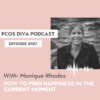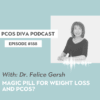PCOS and Bone Health – What’s the Connection?
 Guest post by Dr. Rashmi Kudesia M.D., M.Sc.
Guest post by Dr. Rashmi Kudesia M.D., M.Sc.
Many women given a diagnosis of polycystic ovary syndrome (PCOS) are overwhelmed by all the aspects of health that PCOS can impact. The specific hormonal and metabolic effects can indeed have a dizzying array of potential consequences – from the well-known such as excess facial or body hair (hirsutism) and insulin resistance or diabetes to less frequently-discussed topics such as mood disorders, male-pattern hair loss and others. Among the many questions I have been asked about PCOS, though, the topic for this blog was a first for me – is there a connection between PCOS and bone health?
For anyone interested in hormones (as an endocrinologist, this definitely includes me!), or the general intricacies of the human body, the reasons why we might hypothesize a connection are fascinating. In general, women with PCOS do not regularly ovulate, or release an egg. Because of this menstrual cycle irregularity, the estrogen produced by the ovarian follicles (fluid-filled sacs in which eggs grow) averages lower over the menstrual cycle, when compared to women who do ovulate regularly. It is well known that estrogen is a bone-protective hormone, which is part of the reason why post-menopausal status is a risk factor for osteoporosis. On the other hand, many PCOS women have high levels of androgens (the “male” hormones, including testosterone and others), and these hormones are converted to estrogens. Might this protect against a lack of regular ovulation?
To make matters more interesting, this conversion of androgens to estrogens happens in fat tissue, among other places. So it’s also possible that metrics such as body mass index (BMI), body fat distribution or body fat percentage may interact with this relationship. In other words, if you have high androgen levels and are also a bit overweight, perhaps relatively more androgen can be converted to bone-protecting estrogen! Or maybe where you carry your weight can result in local protection of bone density, but not throughout the whole body! Or perhaps some women release more inflammatory markers, which could undo the impact of fat tissue. But… only if this relationship via fat tissue is the main way androgens impact bone health, because it seems that androgens can also directly impact the cells that promote bone growth and stimulate synthesis of collagen. Further, receptors for androgen hormones seem to particularly show up in certain kinds of bone rather than others.
If all of those hypotheticals weren’t enough, let’s add another layer to an already fuzzy question. Bone health is impacted by so many factors. Peak bone mass is achieved by age 25-30, and nearly half of that bone mass is put on during adolescence. So perhaps how someone’s health and PCOS status was at a prior point in time could have a lasting impact that would be unknown if she was included in a research study in her 40s or later. Genetic, nutritional and other lifestyle (dietary calcium and vitamin D consumption and weight-bearing exercise especially!) factors all also impact our bones.
So! Where could that possibly leave us?? Well, with a list of scientific studies that shows a variety of conflicting results and inconsistent findings. Some show no connection, others suggest that PCOS is protective of bone, but yet others say that positive impact may be contingent on age or BMI, or the type of bone, or how one carries their fat tissue, or a variety of other factors. A common thread is that perhaps those women with lean PCOS, with little fat tissue and relatively lower androgen levels, may be at greatest risk. However, even their risk seems lower than women whose cycle is absent due to extreme exercise, dietary restrictions or stress (an umbrella term for this is hypothalamic amenorrhea – i.e. the brain shuts down the reproductive axis when it feels that the time and resources for pregnancy are lacking). In general, lean PCOS women still have higher estrogen levels than those with hypothalamic amenorrhea, and it’s likely enough to protect their bones.
There are not, unfortunately, studies that really have vast enough data to control for all the factors I described here and watch women with PCOS prospectively to see how their health and lifestyle over time might impact their bone density and ultimate fracture risk or incidence. The only longitudinal study I read followed 25 PCOS women over a roughly 20-year timeframe, and it basically found that these women, now post-menopausal, had similar body fat, lean mass, bone mineral density and fracture risk as women without PCOS. Well, I’ve previously written about how many of the lifelong manifestations of PCOS get confusing around the menopausal transition, and some health risks (or in this case, possible benefits!) seem to equalize as we enter the post-menopausal years. So, while this study might give us some reassurance that there’s not a huge unknown risk for PCOS women, its small size hampers how much we can really take away from it.
Suffice it to say, that even if your PCOS may be somewhat bone-protective, a healthy lifestyle with a thoughtful diet and regular exercise, including cardio and weight-bearing, will certainly bring you to your healthiest self! If you are having a period less frequently than every 3 months, make sure you’ve discussed this with your gynecologist or a PCOS specialist, to ensure that you’re not at risk for a panoply of health ramifications, including (since this is today’s topic) possible bone loss from low estrogen in thin women. The good news here is that bone health does not seem to be a topic that merits particular concern for women given the PCOS diagnosis, and following advice to prevent future osteoporosis and fractures is good for all of us, PCOS or no! You can do it!!

Dr. Kudesia is a board-certified Reproductive Endocrinology and Infertility specialist, practicing at Houston IVF in Houston, Texas. She joined Houston IVF in 2018 after practicing in New York City, where she was named a “New York Super Doctors Rising Star” in 2016 and 2017.
After completing her Baccalaureate degree in Biology & Medicine magna cum laude from Brown University, she received her M.D. with honors from the Duke University School of Medicine, where she was selected into a clinical research training program co-sponsored by the National Institutes of Health. Her residency training in Obstetrics & Gynecology at the New York Hospital-Weill Cornell Medical Center was followed by subspecialty training in Reproductive Endocrinology and Infertility (REI) at the Albert Einstein College of Medicine-Montefiore Medical Center, alongside a Masters’ of Science degree in Clinical Research Methods. She subsequently served as a Clinical Assistant Professor at the Icahn School of Medicine at Mount Sinai, as well as the Research Rotational Director for the REI fellowship, and Medical Director of the Brooklyn office of the Reproductive Medicine Associates of New York.
Dr. Kudesia is a Fellow of the American College of Obstetricians and Gynecologists, and an active member of the American Society for Reproductive Medicine (ASRM), Society for Reproductive Endocrinology and Infertility, Androgen Excess & Polycystic Ovary Syndrome Society, and American Medical Association (AMA). She has served in multiple local and national leadership roles in organized medicine, including her current positions as Secretary of the ASRM Women’s Council Executive Board and the ASRM delegate to the AMA Young Physicians’ Section.
Dr. Kudesia has also presented scientific research at national and international conferences, and has received multiple awards and grants for her work. She has published peer-reviewed articles and book chapters, including in leading journals such as Fertility & Sterility and the American Journal of Obstetrics & Gynecology, as well as editing a theme issue on reproductive medicine for the American Medical Association Journal of Ethics. Her current areas of focus include improving in vitro fertilization cycle prognosis, polycystic ovary syndrome, LGBT fertility, and fertility awareness, counseling, and access to care. She actively promotes women’s health and wellness on social media via Twitter, Facebook, and Instagram.








I will provide some input. My daughter was diagnosed with PCOS after taking birth control pills and her period not coming back for over a year. During this time she was also stressed, worked out a lot and didn’t eat enough. When her hormones were tested, all came back suppressed except testosterone which was high.
She took some herbs to bring back her period which did indeed work, but I can tell her hormones are still unbalanced by her acne, and other symptoms. Not sure if she is having periods without ovulation or not. After reading the article it makes me wonder if she does not have PCOS, but had Hypothalamic Amenorhea.
She recently had a bone scan done for a study and it came back that her bone density did not equal her age which did not surprise us because she got a bone fracture in her foot from jogging.
Input on her situation would be appreciated, thanks